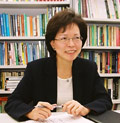Plenary Speakers
Invited Speakers > Plenary Speakers

Prof Amy B M Tsui
University of Hong KongChina
Amy Bik May Tsui is Pro-Vice-Chancellor and Vice President of The University of Hong Kong. She concurrently holds the position of Chair Professor in the Faculty of Education. She obtained her PhD in linguistics in 1986 at The University of Birmingham, U.K. She has published widely in the areas of teacher education, discourse analysis, language policy, and ICT in teacher education. She serves on the Advisory and Editorial Boards of a number of international refereed journals, and has given keynote/plenary presentations in a number of international conferences in Asia and Europe. She is a founding member and a Council member of Asia TEFL. Her most recent books include Understanding Expertise in Teaching – case studies of ESL teachers, (2003, Cambridge University Press); Classroom Discourse and the Space of Learning, (2004, Lawrence Erlbaum Associates (LEA) co-authored with Ference Marton); Medium of Instruction Policies – Which Agenda? Whose Agenda? (2004) and Language Policy, Culture, and Identity in Asian Contexts (2007), (both co-edited with James Tollefson and published by LEA, now Francis Taylor/Routledge); and Learning in School-University Partnership: Sociocultural Perspectives (in press, Francis Taylor/Routledge, co-authored with Gwyn Edwards and Francis Lopez-Real).
Presentation
Internationalization of Higher Education and Linguistic Paradoxes
Since the impact of globalization on almost every aspect of our lives became evident in the nineties, internationalization has become part of the strategic plans of universities world-wide. Targets have been set for increasing the proportion of staff and students from other parts of the world and making undergraduate and postgraduate programmes internationally competitive. Offices for internationalization have become part of the infra-structure of most universities. In more recent years, Asian countries have joined the race by competing to be the educational hub of the region. So far, much of the discussion of the impact of globalization on higher education has focused on issues like quality, efficiency, governance and management and forms of programme delivery. Relatively little attention has been paid to the fact that in non-English mother tongue countries, internationalization of higher education has important implications for the medium of instruction at university which in turn impacts on that in the school system. More and more Asian countries, for instance, are adopting English as a medium of instruction in schools and adopting early partial, if not total, immersion, often to the detriment of the development of the students’ first language and cognitive capabilities. Internationalizing the staff and student body also has a profound impact on the “public space” of universities and the ways in which students from diverse linguistic, ethnic and cultural backgrounds perceive and position themselves in this space, which could result in social and cultural exclusiveness rather than inclusiveness, and cultural alienation rather than integration. Using Hong Kong as a case, this paper examines the linguistic paradoxes that emanate from the internationalization of higher education and the issues that underlie these paradoxes such as linguistic rights, linguistic and cultural domination versus equality, inclusiveness versus exclusiveness, cultural alienation versus accommodation and understanding. It points out that these highly complex issues must be grappled with by individuals with sensitivity and respect for diversity as they live out their roles as responsible global citizens.
